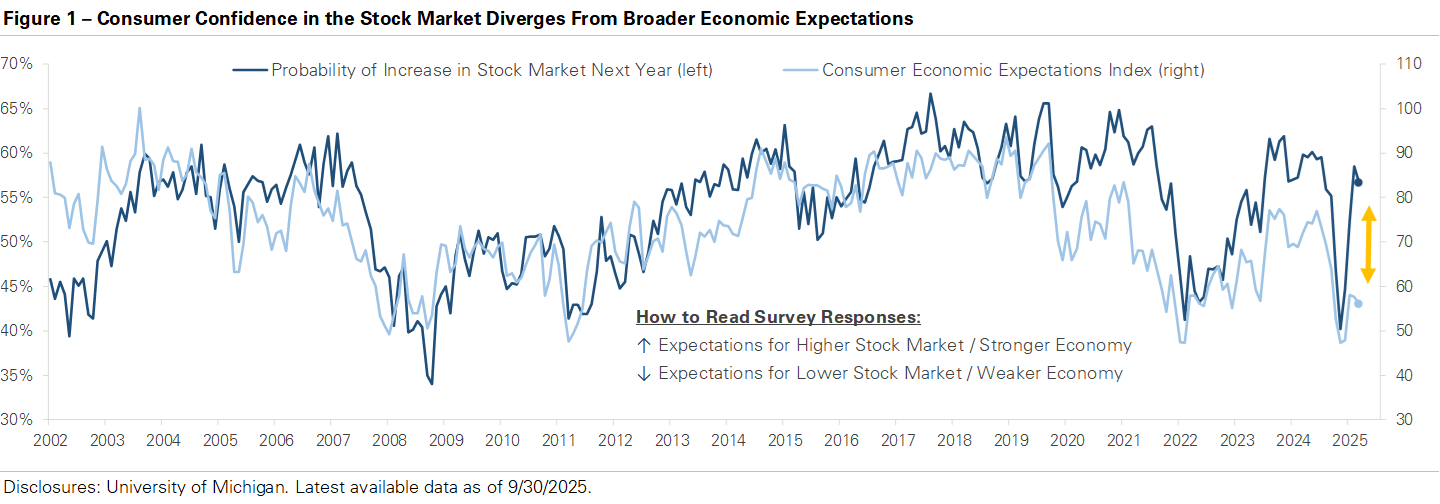
Recent consumer survey data has revealed a widening gap between how consumers view the stock market and the economy. The dark blue line tracks the percentage of consumers who believe the stock market will rise over the next year, while the light blue line shows the University of Michigan’s Consumer Expectations Index which measures outlooks for income, employment, and overall economicconditions. Historically, these two series move together: when consumers feelbetter about the economy, they feel better about the stock market. However,that relationship has broken down this year. Nearly 60% of consumers expect thestock market to rise, while the expectations index sits near levels from thepandemic and the 2008 financial crisis. The takeaway: confidence in the stockmarket has rebounded, but overall sentiment remains weak.
Consumers are increasingly optimistic about the stock market. The S&P 500 has setover 20 new all-time highs since the end of May, and investors expect more gains. Corporate earnings have proven resilient, and the artificialintelligence industry is driving both economic and earnings growth as hundredsof billions are invested in AI infrastructure. Trade policy uncertainty haseased from earlier this year, and the Federal Reserve’s September rate cutreinforced expectations for a “soft landing”, where the economy slows butavoids a recession. Many households have directly benefited from the market’sgains through investment and retirement accounts, boosting confidence despitemixed signals from the economy and labor market.
Whileconsumers are confident in the stock market, they are cautious about theeconomy. Housing affordability remains a major concern, with elevated mortgagerates and high home prices. Inflation has moderated from its peak, but itcontinues to pressure household budgets, especially for essentials like food,healthcare, and rent. Meanwhile, the labor market has cooled after a post-pandemicsurge, when demand for workers outpaced supply and companies raised wages. Jobgrowth has slowed, the number of job openings has declined, and unemploymenthas risen, leaving some workers less certain about future income and employmentprospects. The result is growing unease about household finances, despite recordstock prices.
It's rare to see such a wide gap between consumers’ views of the stock market and the broader economy. The divergence highlights a key tension: confidence in markets is rising, but many households continue to feel pressure from housing costs, inflation, and labor market uncertainty. The gap matters because theconsumer accounts for roughly 70% of all U.S. economic activity. If sentimentremains weak, it could begin to weigh on consumer spending, which has supportedeconomic growth, and the optimism that’s powered the stock market to new highs.

Important Disclosures
Views expressed are as of the date indicated, based on the information available at that time, and may change based on market or other conditions. Investment decisions should be based on an individual’s own goals, time horizon, and tolerance for risk. Investing involves risk, including risk of loss. Investment advisory services provided by Provident Financial Planning, LLC, a SEC-Registered Investment Advisor.
The information and opinions provided herein are provided asgeneral market commentary only and are subject to change at any time withoutnotice. This commentary may contain forward-looking statements that are subjectto various risks and uncertainties. None of the events or outcomes mentionedhere may come to pass, and actual results may differ materially from thoseexpressed or implied in these statements. No mention of a particular security,index, or other instrument in this report constitutes a recommendation to buy,sell, or hold that or any other security, nor does it constitute an opinion onthe suitability of any security or index. The report is strictly aninformational publication and has been prepared without regard to theparticular investments and circumstances of the recipient.
Past performance does not guarantee or indicate future results.Any index performance mentioned is for illustrative purposes only and does notreflect any management fees, transaction costs, or expenses. Indexes are unmanaged, and one cannot invest directly in an index. Index performance does not represent the actual performance that would be achieved by investing in a fund.
Subscribe to receive the latest blog posts to your inbox every week.
Guided by our values of faith, service, and transparency, we at Provident Financial Planning are ready to help you navigate your financial journey. Schedule a consultation with us and discover how we can create a personalized financial plan for you.
